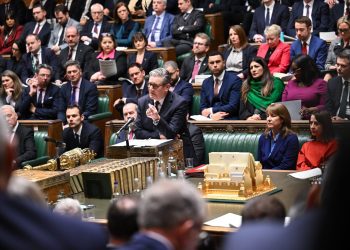A group of cross-party MPs have set out a “ready to go” blueprint for an independent review of the UK’s first past the post (FPTP) electoral system.
The all-party parliamentary group (APPG) for fair elections, the largest of its kind in Westminster, has developed the terms of reference for a “national commission on electoral reform” in consultation with constitutional experts and academics.
The group’s chair, Labour MP and former frontbencher Alex Sobel, described its proposal as “a ready to go plan to independently review how parliament is elected, promote a national conversation, and build consensus on a way forward”.
He added: “The government could greenlight the process without distracting from its priority missions and then simply let the national commission go about its work.”
The document, shared exclusively with Politics.co.uk ahead of its publication today, outlines a comprehensive programme for ministers to adopt.
“The government has a duty to identify and mitigate serious risks to Britain”, Sobel said. “These now include the possibility of an extreme party securing a majority government with the support of less than three in ten voters.”
Labour won almost two-thirds of seats in the House of Commons (411) in the 2024 general election with just over one-third of the popular vote (33.7%). The APPG also points to a British Social Attitudes survey published in June, which found that 60% of voters were in favour of electoral reform.
***Politics.co.uk is the UK’s leading digital-only political website. Subscribe to our daily newsletter for all the latest news and analysis.***
Cross-party MPs to demand ‘fair and democratic’ voting system in commons debate
A spokesperson for the APPG stated that the proposed commission would begin by asking “what do voters actually want from an electoral system in modern Britain?” before assessing whether FPTP or alternative systems meet those requirements.
The spokesperson added: “As part of its work the commission would aim to promote a national conversation about how our elections shape our politics, democracy and society.”
In the document’s foreword, the APPG’s leading officers write that the FPTP system “will continue to produce increasingly unfair and unrepresentative results, will continue eroding public trust in politics, and even threatens to undermine the resilience and stability of our democratic system.”
Sobel, writing alongside Green MP Ellie Chowns, Liberal Democrat frontbencher Lisa Smart and Conservative peer Lord Balfe, adds: “We believe the government has a responsibility to urgently address the use of [FPTP] for general elections…
“The terms of reference set out here propose an approach to building consensus about what a suitable voting system for modern Britain looks like, while at the same time fostering a national debate about our elections and democracy…
“It does not purport to be the only means by which a review of the voting system could be delivered; instead it sets out one viable approach to combining broad consultation, meaningful deliberation, and expert evidence into an effective, independent process capable of commanding public trust and confidence.”
The document states that the purpose of a national commission on electoral reform (NCER) would be to answer four questions “in a manner able to command the trust and confidence of the British public”. Those questions are:
- What are the criteria for a suitable voting system for general elections in modern Britain?
- Does the current FPTP voting system meet these criteria?
- Are there other voting systems which might better meet these criteria?
- Based on these criteria, on balance, which voting system would best serve modern Britain?
NCER, its proposed terms of reference outline, would consult both the public at large and relevant stakeholders, including electoral administrators, former and current parliamentarians, civil society organisations, and overseas groups with relevant experience.
The NCER’s final report, to be produced within 12 months of its launch, would then be laid before parliament. The government would be expected to issue a statement in response and set out the next course of action.
The commission itself would be composed of a panel of independent commissioners, acting as its executive; a secretariat led by a senior civil servant, providing administrative support; an expert panel, providing politically impartial advice and evidence; and a “voters’ forum”.
The APPG describes the voters’ forum as a “deliberative democratic body of around 100 members of the public, selected to accurately reflect the diversity of the electorate, supported by professional and impartial facilitators.”
The fair elections APPG launched in November 2024 with the backing of former Conservative cabinet ministers Rory Stewart and Amber Rudd. 55% of the APPG’s membership are Labour parliamentarians.
At present the group has 156 officers, of whom 138 are MPs.
***Politics.co.uk is the UK’s leading digital-only political website. Subscribe to our daily newsletter for all the latest news and analysis.***
The group’s proposals coincide with government legislation to remove the FPTP system for mayoral and police and crime commissioner elections.
The APPG notes that Angela Rayner, whose department is responsible for the English Devolution and Community Empowerment Bill, appeared to justify the change on the grounds that officials “can be elected by just a fraction of the vote” under the current system.
However, Rayner has previously dismissed calls for the government to establish a national commission on electoral reform to assess perceived issues with the FPTP system.
In December 2024, Lib Dem MP Olly Glover called on the deputy prime minister to establish a commission in line with the APPG’s position. Rayner responded simply: “No.”
The government has shown no enthusiasm for electoral reform so far this parliament. Rushanara Ali, the then-democracy minister, told the House in January that there are “no plans” to change the FPTP for national contests.
Ali, who resigned her post early last month, said: “The [FPTP] system, while not perfect, provides for… a direct relationship between members of parliament and their local constituency.”
In December 2024, the House of Commons voted in favour of electoral reform for the first time in history. 138 MPs supported Lib Dem MP Sarah Olney’s Elections (Proportional Representation) Bill, with 136 opposed.
Josh Self is editor of Politics.co.uk, follow him on Bluesky here and X here.
Politics.co.uk is the UK’s leading digital-only political website. Subscribe to our daily newsletter for all the latest news and analysis.
The post Cross-party MPs publish ‘ready to go’ blueprint for electoral reform commission appeared first on Politics.co.uk.

































